International Business: Ethical Philosophies, CSR, and Offshoring
VerifiedAdded on 2023/01/23
|5
|1068
|90
Homework Assignment
AI Summary
This assignment explores the influence of ethical philosophies on corporate decision-making in international business, particularly in the context of offshoring jobs and products. The first question examines how different ethical frameworks, such as Kantian, utilitarian, virtue, and eastern philosophical theories, can either hinder or assist managers in making ethical choices regarding offshoring. It emphasizes the importance of considering cultural views, government regulations, and environmental impact. The second question delves into how combining commercial objectives with social goals can enhance corporate social responsibility (CSR) efforts, while also acknowledging potential conflicts. The analysis utilizes real-world examples from companies like Coca-Cola, Starbucks and CISCO to illustrate these concepts. The assignment highlights how businesses can balance profitability with ethical and social considerations to improve their impact and reputation.
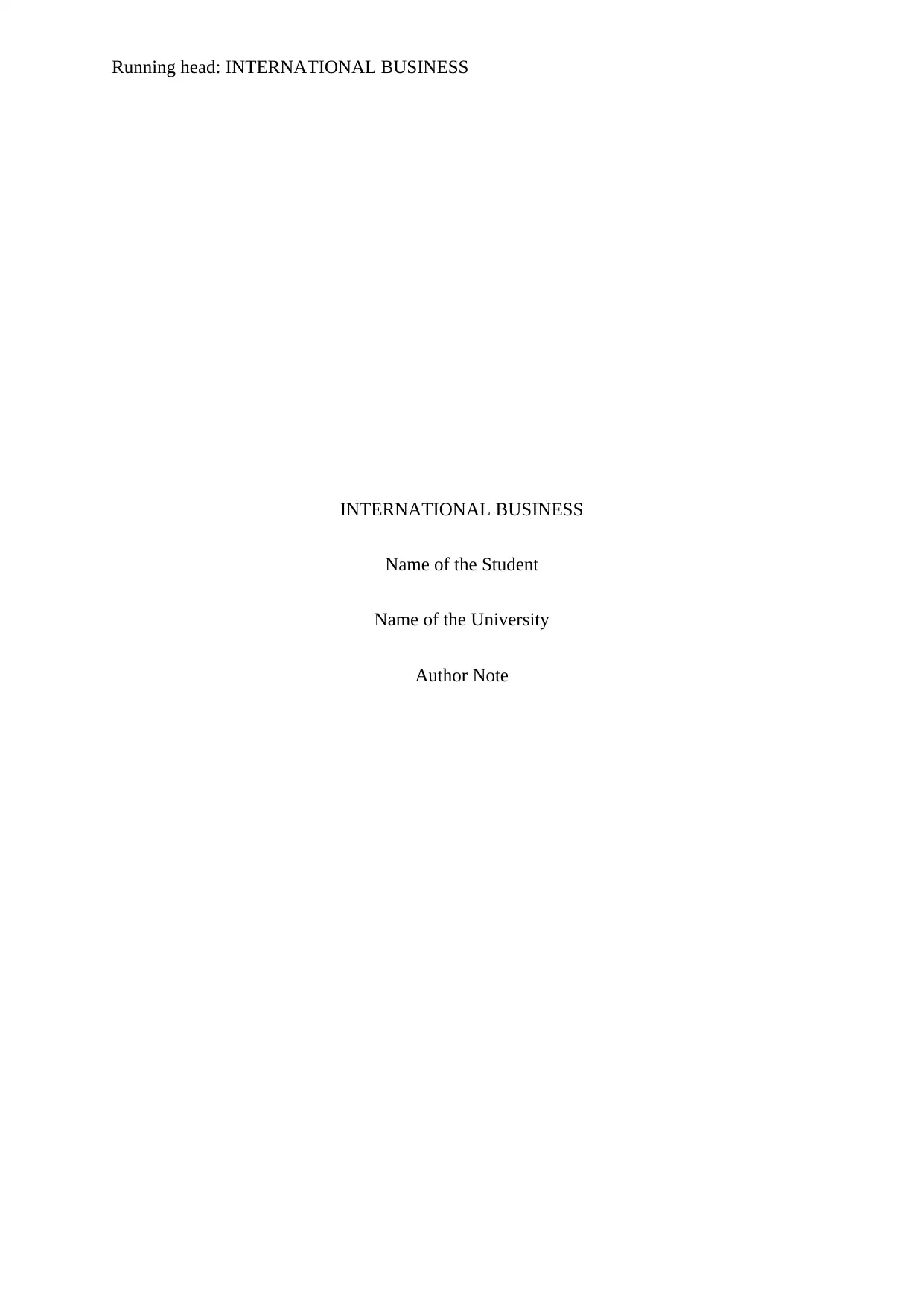
Running head: INTERNATIONAL BUSINESS
INTERNATIONAL BUSINESS
Name of the Student
Name of the University
Author Note
INTERNATIONAL BUSINESS
Name of the Student
Name of the University
Author Note
Paraphrase This Document
Need a fresh take? Get an instant paraphrase of this document with our AI Paraphraser
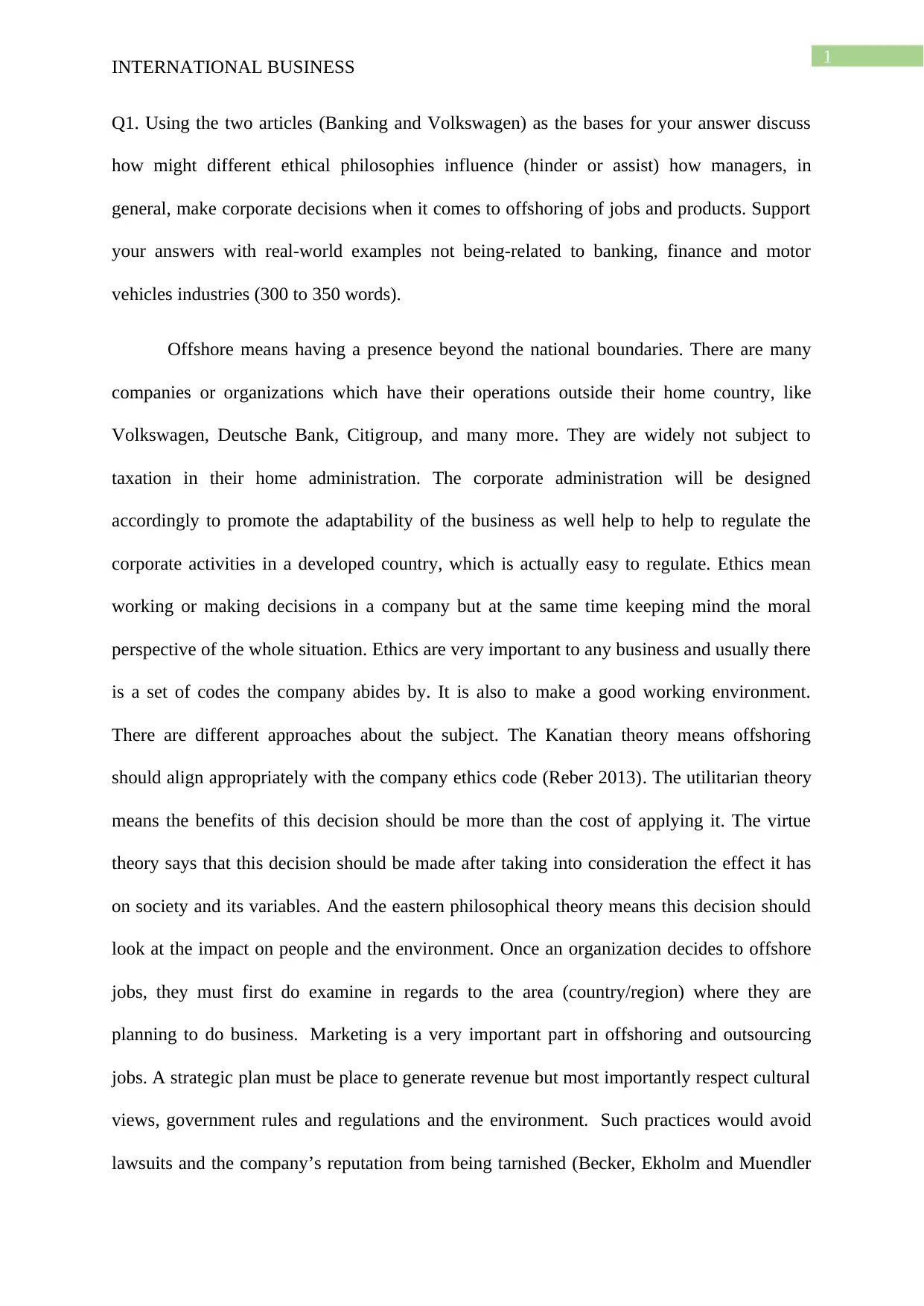
1
INTERNATIONAL BUSINESS
Q1. Using the two articles (Banking and Volkswagen) as the bases for your answer discuss
how might different ethical philosophies influence (hinder or assist) how managers, in
general, make corporate decisions when it comes to offshoring of jobs and products. Support
your answers with real-world examples not being-related to banking, finance and motor
vehicles industries (300 to 350 words).
Offshore means having a presence beyond the national boundaries. There are many
companies or organizations which have their operations outside their home country, like
Volkswagen, Deutsche Bank, Citigroup, and many more. They are widely not subject to
taxation in their home administration. The corporate administration will be designed
accordingly to promote the adaptability of the business as well help to help to regulate the
corporate activities in a developed country, which is actually easy to regulate. Ethics mean
working or making decisions in a company but at the same time keeping mind the moral
perspective of the whole situation. Ethics are very important to any business and usually there
is a set of codes the company abides by. It is also to make a good working environment.
There are different approaches about the subject. The Kanatian theory means offshoring
should align appropriately with the company ethics code (Reber 2013). The utilitarian theory
means the benefits of this decision should be more than the cost of applying it. The virtue
theory says that this decision should be made after taking into consideration the effect it has
on society and its variables. And the eastern philosophical theory means this decision should
look at the impact on people and the environment. Once an organization decides to offshore
jobs, they must first do examine in regards to the area (country/region) where they are
planning to do business. Marketing is a very important part in offshoring and outsourcing
jobs. A strategic plan must be place to generate revenue but most importantly respect cultural
views, government rules and regulations and the environment. Such practices would avoid
lawsuits and the company’s reputation from being tarnished (Becker, Ekholm and Muendler
INTERNATIONAL BUSINESS
Q1. Using the two articles (Banking and Volkswagen) as the bases for your answer discuss
how might different ethical philosophies influence (hinder or assist) how managers, in
general, make corporate decisions when it comes to offshoring of jobs and products. Support
your answers with real-world examples not being-related to banking, finance and motor
vehicles industries (300 to 350 words).
Offshore means having a presence beyond the national boundaries. There are many
companies or organizations which have their operations outside their home country, like
Volkswagen, Deutsche Bank, Citigroup, and many more. They are widely not subject to
taxation in their home administration. The corporate administration will be designed
accordingly to promote the adaptability of the business as well help to help to regulate the
corporate activities in a developed country, which is actually easy to regulate. Ethics mean
working or making decisions in a company but at the same time keeping mind the moral
perspective of the whole situation. Ethics are very important to any business and usually there
is a set of codes the company abides by. It is also to make a good working environment.
There are different approaches about the subject. The Kanatian theory means offshoring
should align appropriately with the company ethics code (Reber 2013). The utilitarian theory
means the benefits of this decision should be more than the cost of applying it. The virtue
theory says that this decision should be made after taking into consideration the effect it has
on society and its variables. And the eastern philosophical theory means this decision should
look at the impact on people and the environment. Once an organization decides to offshore
jobs, they must first do examine in regards to the area (country/region) where they are
planning to do business. Marketing is a very important part in offshoring and outsourcing
jobs. A strategic plan must be place to generate revenue but most importantly respect cultural
views, government rules and regulations and the environment. Such practices would avoid
lawsuits and the company’s reputation from being tarnished (Becker, Ekholm and Muendler
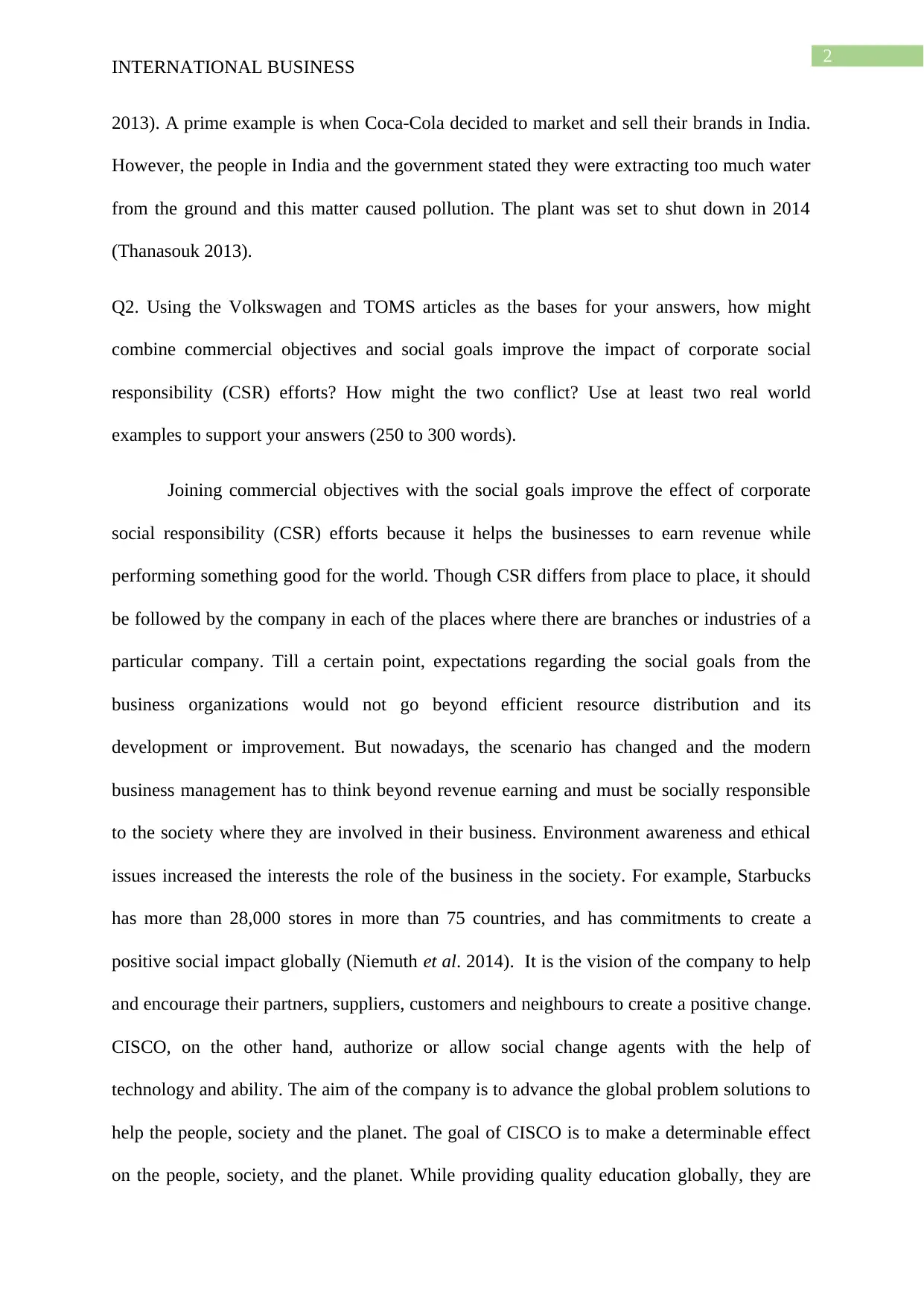
2
INTERNATIONAL BUSINESS
2013). A prime example is when Coca-Cola decided to market and sell their brands in India.
However, the people in India and the government stated they were extracting too much water
from the ground and this matter caused pollution. The plant was set to shut down in 2014
(Thanasouk 2013).
Q2. Using the Volkswagen and TOMS articles as the bases for your answers, how might
combine commercial objectives and social goals improve the impact of corporate social
responsibility (CSR) efforts? How might the two conflict? Use at least two real world
examples to support your answers (250 to 300 words).
Joining commercial objectives with the social goals improve the effect of corporate
social responsibility (CSR) efforts because it helps the businesses to earn revenue while
performing something good for the world. Though CSR differs from place to place, it should
be followed by the company in each of the places where there are branches or industries of a
particular company. Till a certain point, expectations regarding the social goals from the
business organizations would not go beyond efficient resource distribution and its
development or improvement. But nowadays, the scenario has changed and the modern
business management has to think beyond revenue earning and must be socially responsible
to the society where they are involved in their business. Environment awareness and ethical
issues increased the interests the role of the business in the society. For example, Starbucks
has more than 28,000 stores in more than 75 countries, and has commitments to create a
positive social impact globally (Niemuth et al. 2014). It is the vision of the company to help
and encourage their partners, suppliers, customers and neighbours to create a positive change.
CISCO, on the other hand, authorize or allow social change agents with the help of
technology and ability. The aim of the company is to advance the global problem solutions to
help the people, society and the planet. The goal of CISCO is to make a determinable effect
on the people, society, and the planet. While providing quality education globally, they are
INTERNATIONAL BUSINESS
2013). A prime example is when Coca-Cola decided to market and sell their brands in India.
However, the people in India and the government stated they were extracting too much water
from the ground and this matter caused pollution. The plant was set to shut down in 2014
(Thanasouk 2013).
Q2. Using the Volkswagen and TOMS articles as the bases for your answers, how might
combine commercial objectives and social goals improve the impact of corporate social
responsibility (CSR) efforts? How might the two conflict? Use at least two real world
examples to support your answers (250 to 300 words).
Joining commercial objectives with the social goals improve the effect of corporate
social responsibility (CSR) efforts because it helps the businesses to earn revenue while
performing something good for the world. Though CSR differs from place to place, it should
be followed by the company in each of the places where there are branches or industries of a
particular company. Till a certain point, expectations regarding the social goals from the
business organizations would not go beyond efficient resource distribution and its
development or improvement. But nowadays, the scenario has changed and the modern
business management has to think beyond revenue earning and must be socially responsible
to the society where they are involved in their business. Environment awareness and ethical
issues increased the interests the role of the business in the society. For example, Starbucks
has more than 28,000 stores in more than 75 countries, and has commitments to create a
positive social impact globally (Niemuth et al. 2014). It is the vision of the company to help
and encourage their partners, suppliers, customers and neighbours to create a positive change.
CISCO, on the other hand, authorize or allow social change agents with the help of
technology and ability. The aim of the company is to advance the global problem solutions to
help the people, society and the planet. The goal of CISCO is to make a determinable effect
on the people, society, and the planet. While providing quality education globally, they are
⊘ This is a preview!⊘
Do you want full access?
Subscribe today to unlock all pages.

Trusted by 1+ million students worldwide
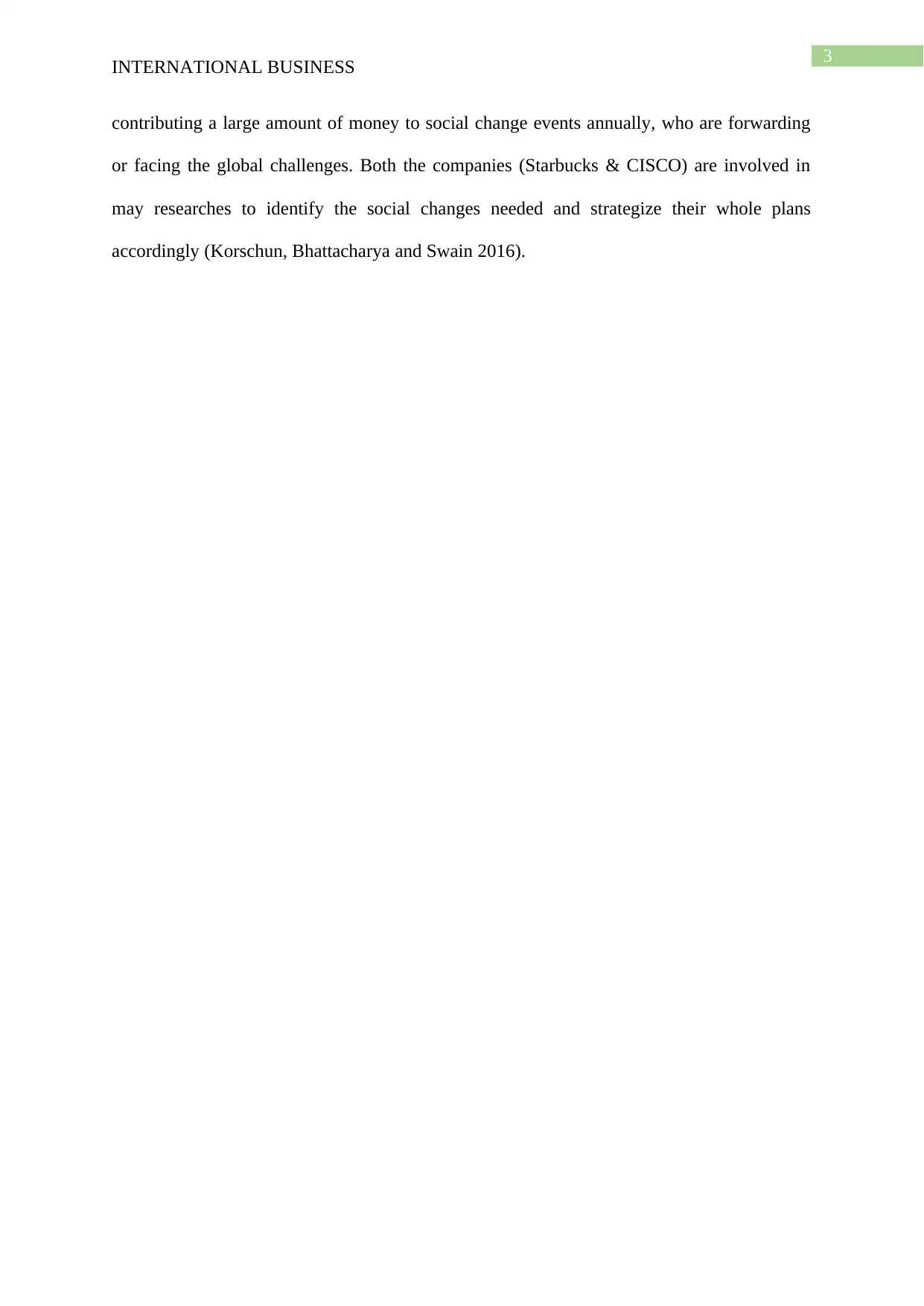
3
INTERNATIONAL BUSINESS
contributing a large amount of money to social change events annually, who are forwarding
or facing the global challenges. Both the companies (Starbucks & CISCO) are involved in
may researches to identify the social changes needed and strategize their whole plans
accordingly (Korschun, Bhattacharya and Swain 2016).
INTERNATIONAL BUSINESS
contributing a large amount of money to social change events annually, who are forwarding
or facing the global challenges. Both the companies (Starbucks & CISCO) are involved in
may researches to identify the social changes needed and strategize their whole plans
accordingly (Korschun, Bhattacharya and Swain 2016).
Paraphrase This Document
Need a fresh take? Get an instant paraphrase of this document with our AI Paraphraser
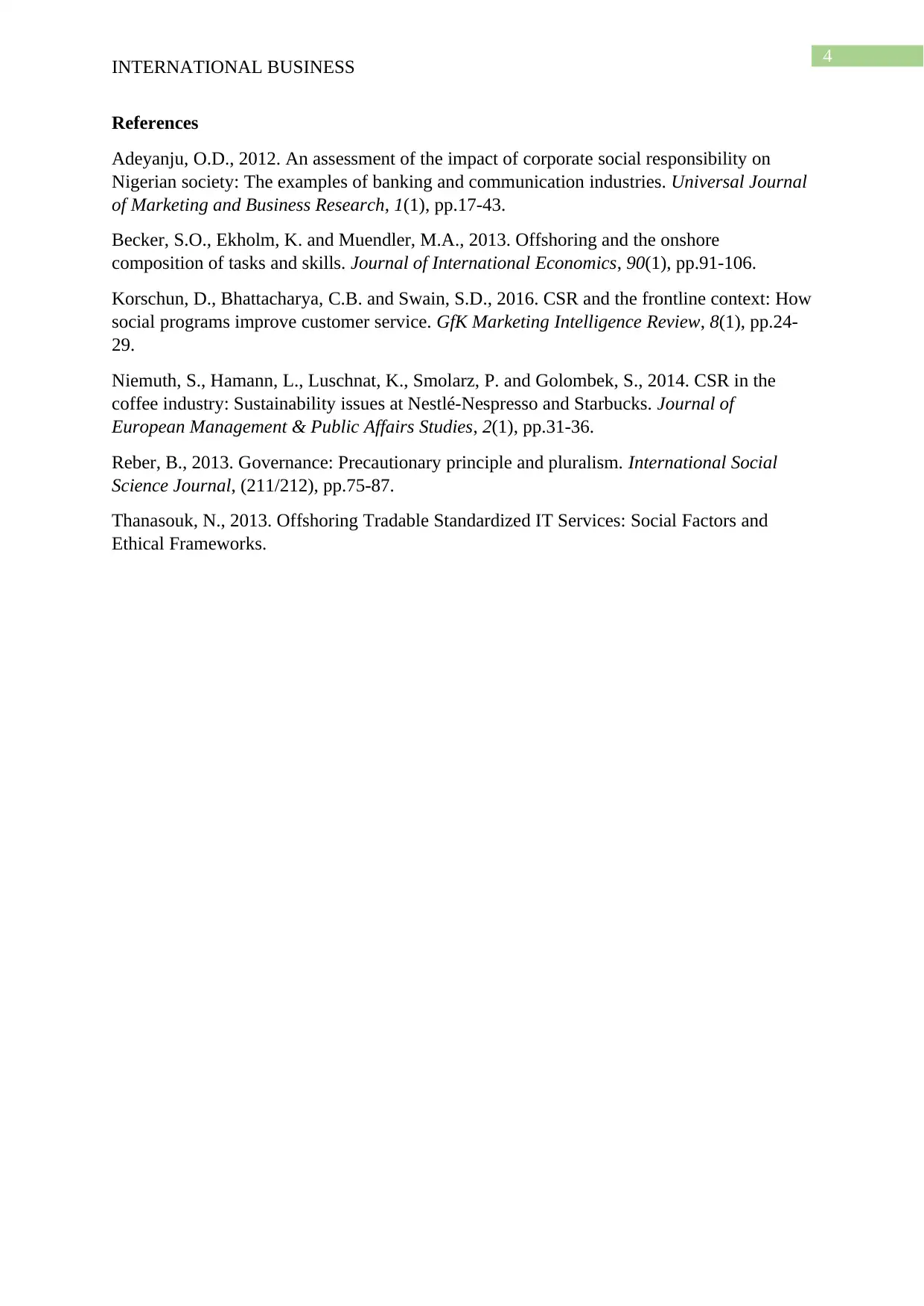
4
INTERNATIONAL BUSINESS
References
Adeyanju, O.D., 2012. An assessment of the impact of corporate social responsibility on
Nigerian society: The examples of banking and communication industries. Universal Journal
of Marketing and Business Research, 1(1), pp.17-43.
Becker, S.O., Ekholm, K. and Muendler, M.A., 2013. Offshoring and the onshore
composition of tasks and skills. Journal of International Economics, 90(1), pp.91-106.
Korschun, D., Bhattacharya, C.B. and Swain, S.D., 2016. CSR and the frontline context: How
social programs improve customer service. GfK Marketing Intelligence Review, 8(1), pp.24-
29.
Niemuth, S., Hamann, L., Luschnat, K., Smolarz, P. and Golombek, S., 2014. CSR in the
coffee industry: Sustainability issues at Nestlé-Nespresso and Starbucks. Journal of
European Management & Public Affairs Studies, 2(1), pp.31-36.
Reber, B., 2013. Governance: Precautionary principle and pluralism. International Social
Science Journal, (211/212), pp.75-87.
Thanasouk, N., 2013. Offshoring Tradable Standardized IT Services: Social Factors and
Ethical Frameworks.
INTERNATIONAL BUSINESS
References
Adeyanju, O.D., 2012. An assessment of the impact of corporate social responsibility on
Nigerian society: The examples of banking and communication industries. Universal Journal
of Marketing and Business Research, 1(1), pp.17-43.
Becker, S.O., Ekholm, K. and Muendler, M.A., 2013. Offshoring and the onshore
composition of tasks and skills. Journal of International Economics, 90(1), pp.91-106.
Korschun, D., Bhattacharya, C.B. and Swain, S.D., 2016. CSR and the frontline context: How
social programs improve customer service. GfK Marketing Intelligence Review, 8(1), pp.24-
29.
Niemuth, S., Hamann, L., Luschnat, K., Smolarz, P. and Golombek, S., 2014. CSR in the
coffee industry: Sustainability issues at Nestlé-Nespresso and Starbucks. Journal of
European Management & Public Affairs Studies, 2(1), pp.31-36.
Reber, B., 2013. Governance: Precautionary principle and pluralism. International Social
Science Journal, (211/212), pp.75-87.
Thanasouk, N., 2013. Offshoring Tradable Standardized IT Services: Social Factors and
Ethical Frameworks.
1 out of 5
Related Documents
Your All-in-One AI-Powered Toolkit for Academic Success.
+13062052269
info@desklib.com
Available 24*7 on WhatsApp / Email
![[object Object]](/_next/static/media/star-bottom.7253800d.svg)
Unlock your academic potential
Copyright © 2020–2026 A2Z Services. All Rights Reserved. Developed and managed by ZUCOL.





